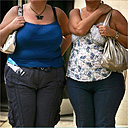
Obesity levels in Scotland are the second highest in the developed world behind the US, statistics have revealed.
A report found that the "obesity epidemic" in Scotland has increased the number of overweight adults by 46% over the past 12 years.
There have been marked rises in obesity among men aged 35 to 64 and in women aged 35 to 44, while one in five children in primary seven was estimated to be overweight in 2004/05.
"These figures provide little evidence that current approaches to obesity are having any impact," the public health information for Scotland report stated.
"The increasing levels of obesity are of serious concerns given the levels of morbidity and mortality associated with obesity," the report said.
The cost of treating obesity-related disease in Scotland was estimated at £171m in 2001.
In Scotland, 25.5% of adults were obese in 2003, well above the average among countries in the OECD group of developed nations.
Although the prevalence of obesity in Scotland remains lower than in the US - 32.2% in 2004 - it is one of the highest of all OECD countries, above Mexico, Canada, the UK as a whole, and Australia.
The condition is likely to result in rising levels of Type 2 diabetes, colon cancer and hypertension. Declining levels of physical activity and "sedentary lifestyles" were highlighted in the report as a possible factor in the rising obesity levels in developed countries.
Changes in diet, including the availability of cheap, energy dense food could also be a factor. The report also said that people were walking less, car use was up and people's jobs are less active.
The report is the latest study warning about obesity in Scotland. In 2005, NHS figures revealed that obesity in children was double the UK average. The previous year the Scottish Executive promised to tackle the "truly frightening" obesity level among Scottish children.
Yesterday, the executive outlined new nutritional guidelines for Scottish schools that would be written into legislation to apply from August next year.
At least two portions of fruit and vegetables will be served each lunchtime, oily fish would be served once every three weeks, while deep-fried food would be limited to three items a week.
Sweets and fizzy drinks will be removed from schools and chips only served as part of an overall balanced and nutritional meal.
Scotland's minister for children, Adam Ingram, said: "By targeting our youngest citizens we can make a lasting difference.
"Putting healthy options on a plate for pupils every day will develop their taste for the food that's good for them and stop unhealthy habits from taking hold."

